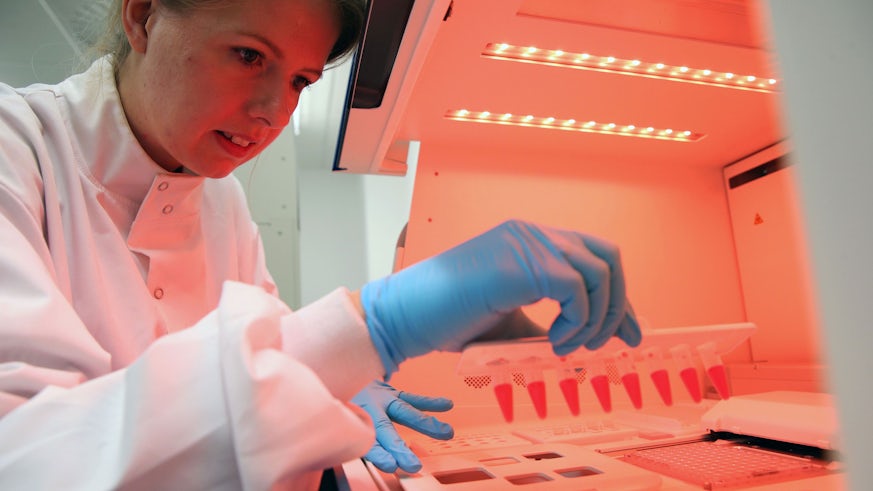£50k funding boost for dementia research
21 May 2018

Scientists at the Centre have received a £50,000 boost in new funding for an innovative research project exploring the genetics of dementia.
The announcement comes during Dementia Action Week, a national initiative aimed at raising awareness of dementia and encouraging people to join efforts to help those affected by the condition.
Genes are the instructions for making living things. Every cell in our body contains thousands of genes, with each gene being a portion of DNA ‘code’. Our entire DNA code is represented by just four letters that are ordered in a specific sequence that is unique to each individual. The DNA code that makes up a specific gene provides the instructions that cells need to produce a specific protein.
A person’s genes play an important role in determining their risk of developing dementia. Scientists at the University have helped to identify nearly 30 gene variations that are linked to the risk of Alzheimer’s disease. These variations are differences in a single letter of the portion of DNA code that makes up these genes.
While these simple spelling differences can play an important role in determining the risk of dementia, there is another feature of the genetic code that can have an effect on dementia risk. Occasionally a section of DNA code, that may only be a few letters long, can accidentally repeat many times. This can cause cells to produce more of the protein that is based on this section of DNA code, and this extra protein can impact the health of nerve cells in the brain.
About this project
With this new funding from Alzheimer’s Research UK, researchers led by Prof Lesley Jones will analyse these repeat sequences in genetic data collected from thousands of people with Alzheimer’s disease, Parkinson’s disease and Huntington’s disease. Her team will investigate whether differences in these repeating sequences of code cause changes in amount of protein in the brain and contribute to the risk of dementia.
When a small sequence of DNA is repeated many times – like a copy and paste error in the code – it can lead to changes in the amounts of genes expressed and the production of potentially harmful proteins in the brain. This project will allow us to analyse these important repeat sequences in thousands of genomes from people both with and without dementia to shed more light on the causes of diseases like Alzheimer’s.Much of our work relies on genetic information provided by people with and without dementia and in this study, we are only able to analyse the effects of genetic changes thanks to people who kindly donated their blood and brains to research. We are very grateful to all of the research volunteers who make the pioneering research here in Cardiff possible.
Dr Sara Imarisio, Head of Research of Alzheimer’s Research UK “Cardiff University is a world-leading centre in research into the genetics of dementia. Innovative research from the team at the University has provided vital insights into the causes of dementia and we are proud to be supporting this pioneering new project. Genetic research is often a crucial first step on the road to new treatments, but the only way we can realise the true potential of new scientific discoveries is through continued investment in dementia research.
“There are 850,000 people living with dementia, with over 45,000 people in Wales alone, so studies like this ambitious project offer real hope in the fight against dementia. Alzheimer’s Research UK receives no government funding for the research we support, and it is only thanks to the generosity of our supporters that we are able to fund vital dementia research like Prof Jones’ project.
